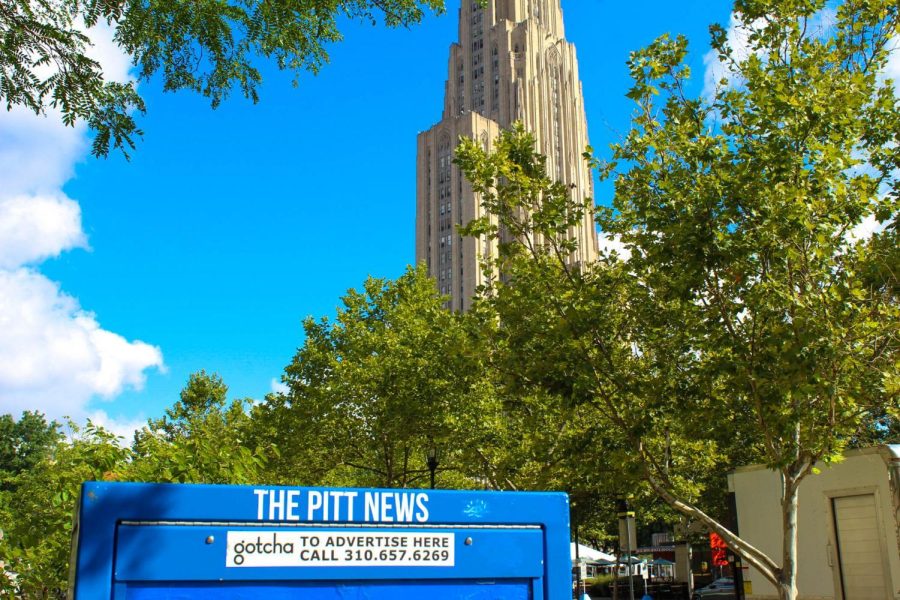Administrators mum on status of chancellor search
January 26, 2014
Students’ closest encounter with their future chancellor could occur by accident.
While some universities have set up meet-and-greets for similar searches, Pitt is operating under confidentiality for candidates’ visitations.
But, if Pitt takes cues from universities of similar size, at least some members of the University will see the face of their potential commander in chief. Open sessions with finalists could also be key to a successful search, according to academic research.
The University of Akron’s presidential search committee will invite university representatives, the mayor and local business CEOs to meet their could-be leaders when they visit the campus this spring.
A similar rendezvous will occur at the University of Memphis this March and has already taken place at the University of Oregon in June 2012 and Iowa State University in September 2011.
But no one will say if community leaders or university representatives will meet Pitt’s next chancellor.
Stephen Tritch, chairman of the Board of Trustees, declined to comment Jan. 11 on whether Pitt’s chancellor search committee would reveal the names of Pitt’s finalists or if they would meet with members of the University.
Christopher W. Hunt, the president of HSZ Media, a company based in Greenwich, Conn., that publishes news and the industry report for the search firm industry, said that while procedures vary depending on the school, finalists typically meet with various department heads, the Board of Trustees and student leaders.
Tritch would not release the number of applications and nominations received, a description of the candidate body nor the names of those who will meet with finalists. He declined to comment on whether the University community will know the search committee’s final candidate selection before the Board of Trustees makes its decision.
Ken Service, University spokesman, said on Jan. 10 that he could not comment on the questions because the committee has not yet shared its plans with him.
But open sessions have a number of benefits, according to a 1990 report, “Choosing a college president: opportunities and constraints.” Judith McLaughlin, educational chair of the Harvard Seminar for New Presidents and the Harvard Seminar for Experienced Presidents, and David Riesman, a late sociologist and Harvard professor, published the report.
McLaughlin and Riesman said that open sessions help finalists learn about the university, show how finalists act under pressure and demonstrate finalists’ interest in the position.
The American Association of University Professors, an organization that promotes academic freedom and shared governance, released a report in 2012 about faculty confidentiality that drew similar conclusions.
“The names of finalists should be made public to the campus community so that the community at large, faculty committees or at least selected members have an opportunity to interview the finalists,” the report said.
But the report acknowledged that confidential searches are becoming an industry standard.
Pitt is not the only school keeping a tight lid on the process. Penn State University is also looking to fill its top executive spot under complete confidentiality.
Although Jill Shockey, Penn State’s spokeswoman, said she could not release information on the Jan. 10 search, the cross-state rivals have released more pieces of information.
On Sept. 10, Penn State released a statement reporting that Isaacson, Miller, the search firm conducting the university’s search, contacted 400 individuals for the position.
According to the statement, the pool comprised of “substantial numbers of women, underrepresented minorities and leaders in the corporate and nonprofit sector.”
Tritch declined to release similar information.
Across the state at Temple University, Hillel Hoffmann, Temple’s spokesman, said he could not reveal if finalists met with groups on campus during its 2012 presidential search for confidentiality reasons.
“What I can tell you is that the finalist, who was recommended by the search committee, came to campus and met with a number of groups before the Board of Trustees chose him as the next president,” Hoffmann said.
That finalist was Neil Theobald, who still holds the position today.
Hoffmann said that the university extended an open invitation to the student body, university employees and staff to ask Theobald questions during three public sessions hosted the day before the Board’s final decision.
While it is still unknown if department heads will meet the search finalists, some deans will meet the prospective leaders through their role in the search committee.
Donald Burke, dean of the Graduate School of Public Health, and Gerald Holder, dean of the Swanson School of Engineering, are on the search committee and will interact with the finalists.
John Delaney, dean of the Katz Graduate School of Business, did not respond to an email asking if the University had indicated whether or not he will meet the finalists.
N. John Cooper, dean of the Dietrich School of Arts and Sciences, was unavailable for comment. If Pitt continues to withhold information, students’ best bet is to keep their eyes peeled while walking around campus.
Hunt said finalists who aren’t public figures can tour the campus with members of the search committee without fear of being recognized. For more familiar faces, Hunt said the search committee conducts the interviews in a private place on campus or at a separate location.
“Obviously if it’s a known individual who is a candidate, and that person is going to stand out … that’s not the way to do it,” Hunt said. “You don’t have [the candidates] walking around.”







